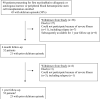Impact of delirium on distress, health-related quality of life, and cognition 6 months and 1 year after hematopoietic cell transplant
- PMID: 20100587
- PMCID: PMC4486483
- DOI: 10.1016/j.bbmt.2010.01.003
Impact of delirium on distress, health-related quality of life, and cognition 6 months and 1 year after hematopoietic cell transplant
Abstract
Delirium commonly occurs during myeloablative hematopoietic cell transplantation (HCT). Little is known about how delirium during the acute phase of HCT affects long-term distress, health-related quality of life (HRQOL), and neurocognitive functioning. This prospective, cohort study examines these outcomes at 6 months and 1 year in 90 patients undergoing HCT. Patients completed a battery assessing distress, HRQOL, and subjective neuropsychological functioning before receiving their first HCT as well as at 6 months and 1 year. Patients with a delirium episode within the 4 weeks after HCT had significantly more distress and fatigue at 6 months (P < .004) and at 1 year (P < .03), compared with patients without delirium. At 1 year, patients with delirium also had worse symptoms of depression and post traumatic stress (P < .03). Patients with delirium had worse physical health on the SF-12 at 6 months (P < .03) and worse mental health on the SF-12 at 1 year (P < .03). At both 6 months and 1 year, patients with delirium after HCT reported worse memory (P < .009) and executive functioning (P < .006). Delirium during the acute phase of HCT is significantly associated with persistent distress, decreased HRQOL, and subjective neurocognitive dysfunction at both 6 months and 1 year.
Copyright 2010 Elsevier Inc. All rights reserved.
Figures
References
-
- Beglinger LJ, Duff K, Van Der Heiden S, Parrott K, Langbehn D, Gingrich R. Incidence of delirium and associated mortality in hematopoietic stem cell transplantation patients. Biol Blood Marrow Transplant. 2006;12:928–935. - PubMed
-
- Fann JR, Roth-Roemer S, Burington BE, Katon WJ, Syrjala KL. Delirium in patients undergoing hematopoietic stem cell transplantation. Cancer. 2002;95:1971–1981. - PubMed
-
- Han L, McCusker J, Cole M, Abrahamowicz M, Primeau F, Elie M. Use of medications with anticholinergic effect predicts clinical severity of delirium symptoms in older medical inpatients. Arch Intern Med. 2001;161:1099–1105. - PubMed
-
- Andrykowski MA, Altmaier EM, Barnett RL, Burish TG, Gingrich R, Henslee-Downey PJ. Cognitive dysfunction in adult survivors of allogeneic marrow transplantation: relationship to dose of total body irradiation. Bone Marrow Transplant. 1990;6:269–276. - PubMed
-
- Julin JE, van Burik JH, Krivit W, et al. Ganciclovir-resistant cytomegalovirus encephalitis in a bone marrow transplant recipient. Transpl Infect Dis. 2002;4:201–206. - PubMed
Publication types
MeSH terms
Grants and funding
LinkOut - more resources
Full Text Sources
Medical


